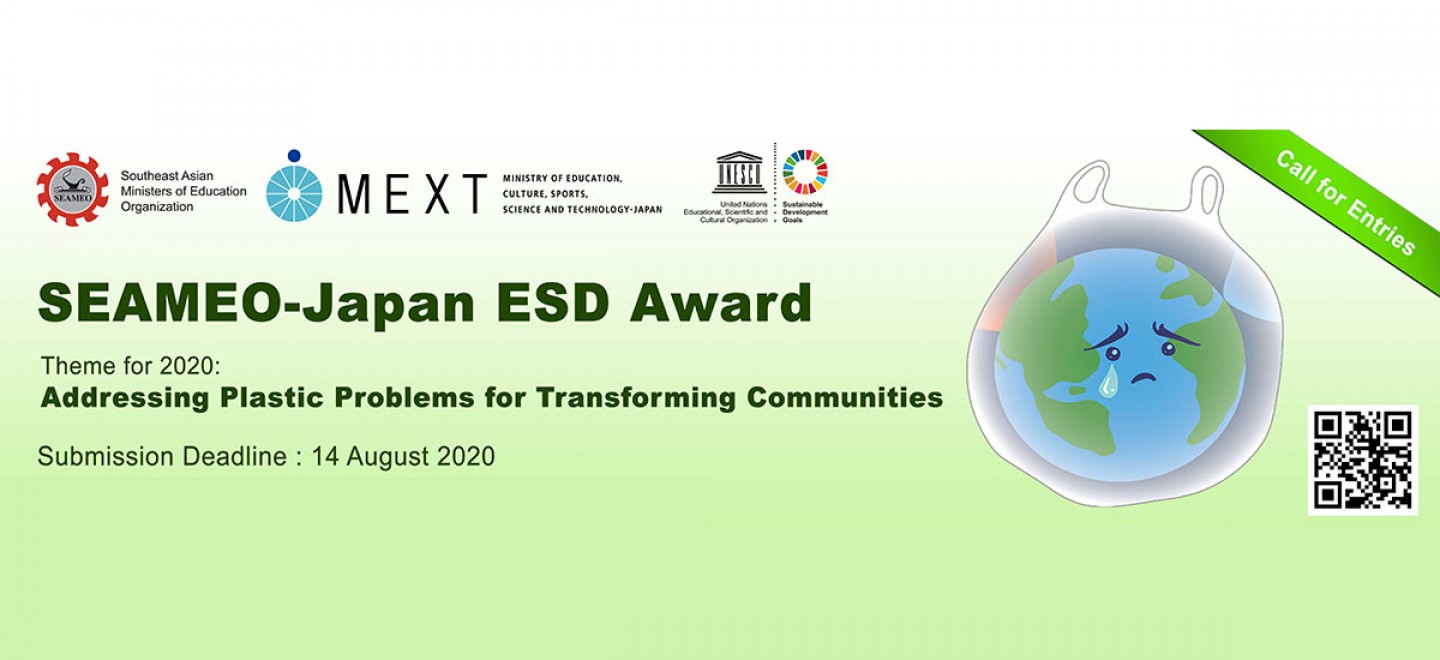Trending Courses: Learn Korean - Yonsei University
For contest, award, grant announcements; follow our Facebook, Instagram, LinkedIn, YouTube, Telegram and Twitter pages.
2020 SEAMEO-Japan ESD Award
“The Government of Japan has contributed and supported the organisation of SEAMEO-Japan ESD Award through the collaboration of MEXT and SEAMEO since 2012”.

Interlanguage News from Japan 
In 2002, the United Nations General Assembly adopted Resolution 57/254 and declared the period 2005-2014 as the “United Nations Decade of Education for Sustainable Development” (DESD).
In its declaration, the United Nations General Assembly defined ESD (Education for Sustainable Development) as a “learning process (or approach to teaching) based on the ideals and principles that underline sustainability and is concerned with all levels and types of learning to provide quality education and foster sustainable human development – learning to know, learning to be, learning to live together, learning to do and learning to transform oneself and society.”
At the end of the DESD in 2014, the UNESCO World Conference held in Japan announced the Global Action Programme (GAP) on ESD aimed at generating and scaling up ESD actions at all levels and in all areas of education, training and learning to accelerate progress towards sustainable development to the post-2015 agenda.
While ESD is implemented worldwide under the GAP, in support of further promoting ESD in Southeast Asia, the Southeast Asian Ministers of Education Organization (SEAMEO) and the Ministry of Education, Culture, Sports, Science and Technology, Japan (MEXT), in cooperation with the UNESCO Asia and Pacific Regional Bureau for Education, have shown their collective commitment to promote best practices in ESD in schools across Southeast Asia, by organising the SEAMEO-Japan Education for Sustainable Development (ESD) Award. The award scheme has been held annually since 2012.
The objectives of the SEAMEO-Japan ESD Award are: To raise awareness of ESD in schools and communities across Southeast Asia; To promote ESD best practices in schools and communities across Southeast Asia; To share and exchange knowledge and best practices on ESD in schools across Southeast Asia and Japan; To encourage networking among schools and communities which implement ESD practices in Southeast Asian countries and Japan; and To support the Sustainable Development Goals (SDG) of United Nations.
1) 1st Prize Winner
2) 2nd Prize Winner
A representative from the winning schools will be sponsored to participate at the award presentation ceremony which will be held at the SEAMEO High Officials Meeting in Bangkok in November 2020.
All shortlisted schools will receive Certificate of Recognition for the school. The coordinators of shortlisted schools (Maximum of 2 persons) will receive the Certificate of Appreciation.
All participating schools that have submitted entries relevant to the theme will be recognised (name, project name and country) on the SEAMEO website and receive the Certificate of Participation.
.
Guidelines for submission of entries Schools can submit information about the school’s programme/project/activity related to the theme “Addressing Plastic Problems for Transforming Communities” from 10 April to 14 August 2020. The deadline of entry submissions is Friday 14 August 2020. (Late submission will not be accepted.) Each school can submit only one entry. The submission of the school’s programme must be done through the template “Submission Form of 2020 SEAMEO-Japan ESD Award”or requested from email address: seameojapan.award@seameo.org. Regarding the submission of entry, each school must adhere to the following format, as specified in the Submission Form:
email to: seameojapan.award@seameo.org
Note: To align with the ESD practices and to save the environment and energy, the Committee will NOT accept the entry in hard/printed copies. All entries submitted to the SEAMEO Secretariat will be acknowledged. If the school has not received any acknowledgement of the receipt from the SEAMEO Secretariat within one week after the submission, please contact the SEAMEO Secretariat (Email: seameojapan.award@seameo.org).
In its declaration, the United Nations General Assembly defined ESD (Education for Sustainable Development) as a “learning process (or approach to teaching) based on the ideals and principles that underline sustainability and is concerned with all levels and types of learning to provide quality education and foster sustainable human development – learning to know, learning to be, learning to live together, learning to do and learning to transform oneself and society.”
At the end of the DESD in 2014, the UNESCO World Conference held in Japan announced the Global Action Programme (GAP) on ESD aimed at generating and scaling up ESD actions at all levels and in all areas of education, training and learning to accelerate progress towards sustainable development to the post-2015 agenda.
While ESD is implemented worldwide under the GAP, in support of further promoting ESD in Southeast Asia, the Southeast Asian Ministers of Education Organization (SEAMEO) and the Ministry of Education, Culture, Sports, Science and Technology, Japan (MEXT), in cooperation with the UNESCO Asia and Pacific Regional Bureau for Education, have shown their collective commitment to promote best practices in ESD in schools across Southeast Asia, by organising the SEAMEO-Japan Education for Sustainable Development (ESD) Award. The award scheme has been held annually since 2012.
The objectives of the SEAMEO-Japan ESD Award are: To raise awareness of ESD in schools and communities across Southeast Asia; To promote ESD best practices in schools and communities across Southeast Asia; To share and exchange knowledge and best practices on ESD in schools across Southeast Asia and Japan; To encourage networking among schools and communities which implement ESD practices in Southeast Asian countries and Japan; and To support the Sustainable Development Goals (SDG) of United Nations.
1) 1st Prize Winner
- USD$1,500
- A study tour to Japan
2) 2nd Prize Winner
- USD$1,000
- USD$500
- USD$1,000
A representative from the winning schools will be sponsored to participate at the award presentation ceremony which will be held at the SEAMEO High Officials Meeting in Bangkok in November 2020.
All shortlisted schools will receive Certificate of Recognition for the school. The coordinators of shortlisted schools (Maximum of 2 persons) will receive the Certificate of Appreciation.
All participating schools that have submitted entries relevant to the theme will be recognised (name, project name and country) on the SEAMEO website and receive the Certificate of Participation.
.
Guidelines for submission of entries Schools can submit information about the school’s programme/project/activity related to the theme “Addressing Plastic Problems for Transforming Communities” from 10 April to 14 August 2020. The deadline of entry submissions is Friday 14 August 2020. (Late submission will not be accepted.) Each school can submit only one entry. The submission of the school’s programme must be done through the template “Submission Form of 2020 SEAMEO-Japan ESD Award”or requested from email address: seameojapan.award@seameo.org. Regarding the submission of entry, each school must adhere to the following format, as specified in the Submission Form:
- Part I - Information about the school;
- School name and contact details
- Brief information about the school such as number of teachers and students and educational level
- Contact details of the coordinator
- Part II - Information about the school’s programme;
- Title of the school’s programme
- Summary of the programme (one half-page of A4 sheet size)
- Background information or reasons why the school created the programme
- Objectives/goals of the programme
- Period of time when the programme was/has been started
- Key knowledge, skills, attitudes/values, and behaviors that the school expects to develop from this programme
- Activities (Strategies/activities of implementation, and brief information of each activity)
- Teaching and learning approaches/strategies that the school has integrated for this school programmme
- Participation with the community/roles of community
- Transformation to the community and ecosystem (Brief information of activities that the school, students, and teachers have contributed for the improvement of community/ecosystem.)
- Programme for monitoring and evaluation mechanisms and summary of results
- Resources used for programme implementation
- Benefits/impacts/positive outcomes of the programme to students, teachers, parents and school. Please include evidence of achievements (How the school’s programme has transformed the behavior of students, teachers and parents to improve the school’s environment in reducing the plastic usage and wastage?)
- Benefits/impacts/positive outcomes of the programme to people in community, and ecosystem. Please include evidence of achievements (How the school’s programme has transformed the behavior of people in the community in reducing the plastic usage and wastage and improve the ecosystem of the community?)
- Plan for sustainability and plan for scaling-up/expansion
- Interrelationship of the school’s programme with other Sustainable Development Goals (SDGs)
- List of attachments such as a copy of the school operational plan, action plan, learning/teaching materials, lesson plans, samples of student worksheet, manuals, etc. (Maximum of five files to be attached with the Submission Form)
- Photographs related to the school programme (Maximum of five photographs with captions written in English)
email to: seameojapan.award@seameo.org
Note: To align with the ESD practices and to save the environment and energy, the Committee will NOT accept the entry in hard/printed copies. All entries submitted to the SEAMEO Secretariat will be acknowledged. If the school has not received any acknowledgement of the receipt from the SEAMEO Secretariat within one week after the submission, please contact the SEAMEO Secretariat (Email: seameojapan.award@seameo.org).
Source: Interlanguage News
Learn More
news japan award contest SEAMEO develop learn school apply join competition asia win united nations un Education Culture Sports Science Technology mext

